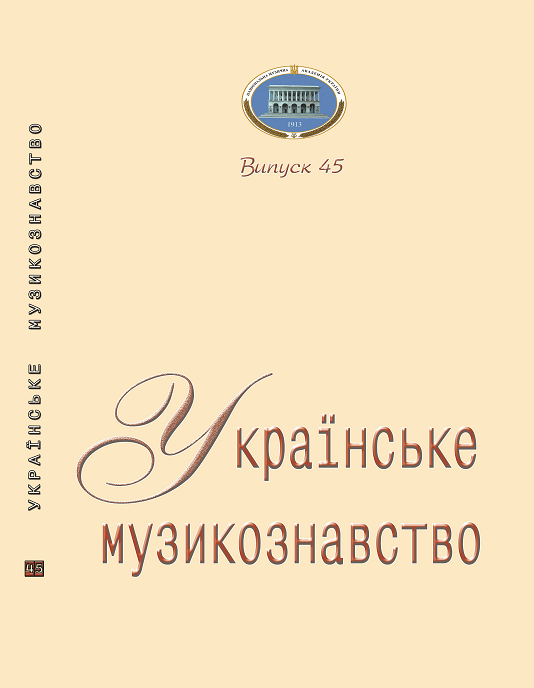SOCIO-CULTURAL PARADIGM OF LVIV COMPOSER SCHOOL
DOI:
https://doi.org/10.31318/0130-5298.2019.0.45.189953Keywords:
Lviv composer school, Carpathian folklore, paradigm of composer creativity, poetry of household music, aesthetismAbstract
The main principles of the Lviv Composer School, which were formed on the basis of long specific traditions of cultural development of the region, are considered.
The main elements of the system of regional composer's thinking are determined. They are: the poetization of domestic music, the subtle aesthetic sense of everyday life, salon, sociable genres, decorative, as a manifestation of aestheticism; elegance category as a specific style category of Lviv Composer School, advantage of concerto over symphony, programmability; specific for the Lviv
Composer School is the layer to it of musical thinking and genre models corresponding, which conceal movement, energy, element, efficiency, relaxation, but not structure, rationality, self-absorption. The Carpathian, especially Hutsul folklore, plays a significant role in the work of almost all artists and greater than the other national schools and Eastern Ukraine; the role of spiritual music, which nevertheless absorbs numerous features of secular and theatrical genres, often thought and perceived as a concert, personal, sensual. The influence of specific European centers is being transformed: Vienna, Prague, Krakow and interest in the new, openness to external impressions, to new trends of the artistic process in the world, though careful attitude to radical experiments.
This has led to selective priorities for style trends: in the past, a striking manifestation of Lviv art and Baroque architecture – but modest achievements of classicism, in recent times, interesting manifestations of romanticism, later symbolism, modernity (secession) - but in general the avoidance of expressionism and urbanism, in the present the diversity and peculiar transformation of the trend of the postmodern – but rather modestly presented avant-garde. Lviv Composers' School demonstrates the attitude to music as a harmonious and beautiful reflection of the world, openness to the general public, and not only to a thin layer of connoisseurs, certain skepticism about art that seeks only progress, only epic and rigid experimentation.
References
Antonyuk, I. (2008). Music collections of Library of Lviv National Academy of Music “Mykola Lysenko” in the light of the historical and cultural process of the region: [Notni kolektsiyi biblioteky LNMA im. M. V. Lysenka u svitli istoryko-kulʹturnoho protsesu krayu]: dys. ... kand.. mystetstvoznav. : 17.00.03 / LNMA im. M.Lysenka. Lʹviv, 180.
Bulka, Yu. (1997). Nestor Nizhankivsky. MP Kotz Publishing House. 60.
Burban, M. (1999). Choral performance of Lviv region. Chors. Conductors [Khorove vykonavstvo Lʹvivshchyny. Khory. Dyryhenty]: posibnyk-dovidnyk / Drohobych ; Lʹviv : Vymir. 368.
Horak, Ya. (2003). Anatoly Vakhnyanin and the formation of musical professionalism in Galicia (second half of XIX - beginning of XX century). [Anatolʹ Vakhnyanyn i stanovlennya muzychnoho profesionalizmu v Halychyni (druha polovyna XIX – pochatok XX st.)]. Dys. kand. mystetstvoznav. 17.00.03 / IMFE im. M.Rylʹsʹkoho NAN Ukrayiny. Kyiv. 244.
Domet (Sadovskyy, V.) (1904) Joseph Kishakevich. Biographical sketch. [Yosyf Kyshakevych. Biohrafichnyy nacherk] // Almanakh muzychnyy; literaturna chast pershoho ilyustrovanoho kalendarya muzychnoho na rik 1904. Lviv. 58–60.
Dutchak, V. (2009). Creative portrait of Oksana Gerasimenko: bandura art at the crossroads of cultures and eras [Tvorchyy portret Oksany Herasymenko: bandurne mystetstvo na perekhresti kulʹtur ta epokh] / Visnyk Prykarpat·sʹkoho universytetu. Mystetstvoznavstvo. Ivano-Frankivsʹk : VDV TSIT «Play». Vyp. 15–16. 136–148.
Zabuzhko, O. (2009). Zabuzhko O. Philosophy of the Ukrainian Idea and the European Context. The period of Franko [Filosofiya ukrayinskoyi ideyi ta yevropeyskyy kontekst. Frankivskyy period] // Vyd. 2. Kyiv : vyd-vo Fakt. 142.
Zahaykevych, M. (1960). Musical life of Western Ukraine in the second half of the nineteenth century. [Muzychne zhyttya Zakhidnoyi Ukrayiny druhoyi polovyny XIX st.] Kyiv: v-vo Akademiyi nauk Ukrayinsʹkoyi RSR,. 190.
Isayevych, Ya. (1996). How did a city called Lviv emerge. [Yak vynyklo misto pid nazvoyu Lʹviv]. // Lʹviv. Istorychni narysy. Lʹviv. 14-23.
Kavunnyk, O. (2014) Ethno-regional dimensions of contemporary Ukrainian musicology [Etnorehionalni vymiry suchasnoho ukrayinskoho muzykoznavstva] // Kultura i Suchasnist No 1. 114–118.
Karasʹ, H. (2009) Preservation and popularization of Vasyl Barvinsky's creative heritage by Ukrainian artists abroad [Zberezhennya i populyaryzatsiya tvorchoyi spadshchyny Vasylya Barvinsʹkoho myttsyamy ukrayinsʹkoho zarubizhzhya] / Prykarpat·sʹkyy visnyk Naukovoho tovarystva im. Shevchenka. Seriya «Slovo». Ivano-Frankivsʹk,. Ch. 2 (6). 222–235.
Karpyak, A. (2002). Flute Art in the Musical Culture of Lviv (XIX-XX centuries): [Fleytove mystetstvo v muzychniy kulʹturi Lʹvova (XIX-XX st.)]: avtoref. dys. kand. mystetstvoznav.: spets. 17.00.03 / NMAU im. P.I.Chaykovsʹkoho. Kyiv. 21.
Kyyanovska, L. (2003). Son of the Century Mykola Kolessa [Syn storichchya Mykola Kolessa]. Monohr. Lviv: vyd-vo NTSH. 496.
Kyyanovska, L. (2008). Letters from Vasily Barvinsky from Prague to relatives in Lviv [Lysty Vasylya Barvinskoho z Prahy do rodychiv u Lvovi] // Visnyk Lvivskoho universytetu Seriya Mystetstvoznavstvo. Lviv: vyd-vo LNU. Vyp. 8. 162–224.
Kostyuk, N. (2015). The liturgical work of Mikhail Verbytsky: the possibility of updating the evaluation criteria in a cultural-style context. [Bohosluzhbova tvorchistʹ Mykhayla Verbytsʹkoho: mozhlyvosti onovlennya kryteriyiv otsinky v kulʹturno-stylʹovomu konteksti]. Ukrayinsʹka muzyka. Lʹviv, Ch. 1-2(15-16). 156–168.
Kudryk, B. (1995). An overview of the history of Ukrainian church music [Ohlyad istoriyi ukrayinskoyi tserkovnoyi muzyky] // Lviv, Instytut ukrayinoznavstva im. I. Kryp'yakevycha NAN Ukrayiny. 128.
Lysko, Z. (1994). Pioneers of Music in Galicia uporyad [Pionery muzychnoho mystetstva v Halychyni] // Red.-uporyad. V. Syvokhip; Lviv: New-York: Vydavnytstvo M. P. Kots, 144.
Lyudkevych, S. (2000). The Problem of Modern Music Culture in Western Ukraine. [Problema suchasnoyi muzychnoyi kultury v Zakhidniy Ukrayini] // S. Lyudkevych. Doslidzhennya, retsenziyi, stati, vystupy. T. II. (Dva tomy). Red.-uporyad. Z. Shtunder. Lviv: Dyvosvit,. 389–395.
Mazepa, L., Mazepa, T. (2003). S The way to the Music Academy in Lviv [Shlyakh do muzychnoyi akademiyi u Lʹvovi] : u 2 t. Lʹviv : SPOLOM, T. 1. 288.
Melnyk, L., Kyyanovska, L. (2001). The parable of Moses [Prytcha pro «Moyseya»] // zhurnal «PiK», 3-9 lypnya. 51–53.
Osadtsya, O. (2005). The Ukrainian notary publishing business in Galicia, Bukovina, Transcarpathia and the emigration of the 19th - first half of the 20th centuries [Ukrayinsʹka notovydavnycha sprava u Halychyni, Bukovyni, na Zakarpatti ta na emihratsiyi XIX - pershoyi polovyny XX stolitʹ ]: dys. ... kand mystetstvoznav. : 17.00.01 / LNMA im. M. Lysenka. Lʹviv,. 161.
Pavlyshyn, S. (1990). Vasylʹ Barvinsʹkyy. Kyyiv : Muzychna Ukrayina. 87.
Tokarchuk, V. (1999). Johann Rukgaber - the first music director of the Galician Music Society. [Yohann Rukhaber – pershyy muzychnyy dyrektor Halytsʹkoho Muzychnoho Tovarystva]. / Musica Galiciana. Ivano-Frankivsʹk, T. 2. 86 – 90.
Yakovlev, O. (2015). Synergy of cultural regional development of Ukraine [Synerhiya kulturnoho rehionalnoho rozvytku Ukrayiny] // Visnyk Lvivskoho universytetu. Seriya mystectvoznavstvo. Vyp. 16. Ch. 1. 12–26.
Yasinovsʹkyy, Yu. (2001). Music. History of Ukrainian Culture. [Muzyka. Istoriya ukrayinsʹkoyi kulʹtury]. Kyiv : Naukova dumka,. T. 2 : Ukrayinsʹka kulʹtura XIII – pershoyi polovyny XVIIstolitʹ.С. URL: http://izbornyk.org.ua/istkult2/ikult246.htm (date of appeal: 24.09.2019).
Chybiński, A. (1929). Do historii muzyki we Lwowie w XVI wieku. [To the history of music in Lviv in the 16th century]. Kwartalnik muzyczny. No 2, 169-192.
Giddens, A. (2007). Nowoczesność i tożsamość [Modernity and identity] przeł. Alina Szulżycka, Wydawnictwo Naukowe PWN, Warszawa, 324.
Lubowiecka, M. Wykonawstwo kameralne w Galicyjskim Towarzystwie Muzycznym w drugiej połowie XIX w. za dyrekcji artystycznej Rudolfa Schwarza [Chamber music performance at the Galician Music Society in the second half of the 19th century under the artistic direction of Rudolf Schwarz] / Musica Galiciana pod red. Leszka Mazepy. Rzeszów, 2000. T.5. 119-127.
Popowicz, O. (1997). Pieśń solowa w twórczości kompozytorów ukraińskich Galicji Wschodniej XIX i XX wieku do 1939 roku. [A solo song in the works of Ukrainian composers of Eastern Galicia of the 19th and 20th centuries up to 1939]. / Musica Galiciana pod red. Leszka Mazepy. Rzeszów,. T. 1. 125-142.
Robertson, R. (1992). Globalisation: Social Theory and Global Culture. London: SAGE Publications. 224.
Robertson, R. (1995). Glocalisation: Time-Space and Homogeniy-Heterogenity. // M. Featherstone S. Lash, R. Robertson (red.), Global Modernities. London: Sage Publications. 25–44.
Sołtys, M.E. Twórczość Mieczysława i Adama Sołtysów w kontekście muzyki polskiej i europejskiej. [Works of Mieczysław and Adam Sołtys in the context of Polish and European music]. Lublin : Polihymnia, 2012. 212.
Słodowa-Hełpa M. Między globalizacją a glokalizacją // Studia Oeconomica Posnaniensia, 2017, vol. 5, no. 5, s. 7–22.




